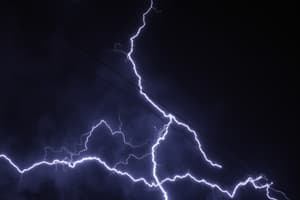Podcast
Questions and Answers
Which statement best describes current in the context of electricity?
Which statement best describes current in the context of electricity?
- Current is the potential difference between two points.
- Current is the total energy consumed by a circuit.
- Current refers to the flow of electric charge. (correct)
- Current is the measure of resistance in a circuit.
What is the unit of measurement for electric current?
What is the unit of measurement for electric current?
- Ampere (correct)
- Ohm
- Watt
- Volt
In a direct current (DC) circuit, how does the flow of electrons behave?
In a direct current (DC) circuit, how does the flow of electrons behave?
- Electrons move oscillating back and forth.
- Electrons flow steadily in one direction. (correct)
- Electrons flow in a random direction.
- Electrons do not flow at all.
Which of the following factors does NOT affect the current flowing through a conductor?
Which of the following factors does NOT affect the current flowing through a conductor?
How is the relationship between current and voltage typically represented in an electrical circuit?
How is the relationship between current and voltage typically represented in an electrical circuit?
Flashcards
Definition of current
Definition of current
The flow of electric charge.
Current unit
Current unit
Ampere (A).
Current direction
Current direction
Conventional current flows from positive to negative.
What is electric current?
What is electric current?
Signup and view all the flashcards
Current and voltage relation
Current and voltage relation
Signup and view all the flashcards
Study Notes
Definition of Current
- Electric current is the flow of electric charge.
- It is measured in amperes (A), representing the rate of flow of charge.
- Charge can be carried by electrons, protons, or ions.
- Conventional current is defined as the flow of positive charge. This is a historical convention, even though electrons are the primary charge carriers in most cases.
- The direction of current is opposite to the direction of electron flow.
Types of Electric Current
- Direct Current (DC):
- Charges flow in one direction.
- Examples: Batteries, solar cells.
- Alternating Current (AC):
- Charges flow back and forth periodically.
- Typically sinusoidal in waveform.
- More efficient for long-distance transmission of power due to voltage step-up capability.
- Examples: Power outlets in homes and buildings.
Factors Affecting Current
- Voltage (V): The driving force that pushes the charges. The higher the voltage, the greater the current for a given resistance.
- Resistance (R): Opposition to the flow of current. The higher the resistance, the lower the current for a given voltage.
- Circuit Components: The components in an electric circuit affect the current flowing through the circuit. Individual component values impact total current.
Relationship Between Voltage, Current, and Resistance
- Ohm's Law: The fundamental relationship between these three quantities.
- Current (I) is directly proportional to the voltage (V) and inversely proportional to the resistance (R).
- Mathematically: I = V/R
Measurement of Current
- Ammeters are used to measure electric current.
- An ammeter is connected in series with the circuit element through which the current is to be measured.
Electric Current in Different Materials
- Conductors: Materials that allow electric current to flow easily. Examples include metals like copper and aluminum.
- Insulators: Materials that resist the flow of electric current. Examples include rubber, glass, and plastic.
- Semiconductors: Materials with conductivity between conductors and insulators. Conductivity can be controlled or modified to act as transistors or diodes.
Current Density
- Current density (J) is the current flowing per unit area perpendicular to the direction of current flow.
- Represents the current intensity at a given point in a conductor.
- Mathematically: J = I/A, where A is the cross-sectional area of the conductor.
Studying That Suits You
Use AI to generate personalized quizzes and flashcards to suit your learning preferences.




